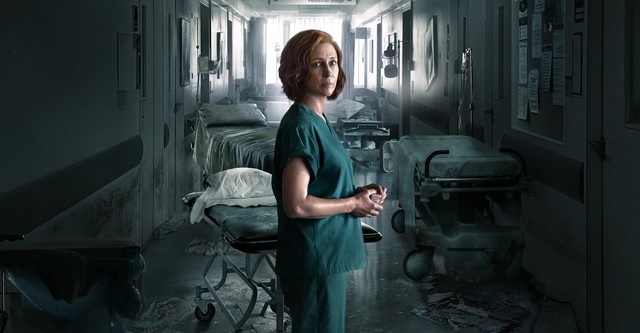by Bryan & Heather
Entering your thirties can be surreal for anyone, but as historians, it also comes with realizing that events we remember living through have become legitimate subjects of study. As with our dive into the twentieth anniversary of the 9/11 attacks in the fall of 2021, we recently found ourselves fascinated by yet another calamity from the early aughts: Hurricane Katrina. Both of us remembered the historical storm, of course, and know in a clinical way the impact it and the bungled government response had on New Orleans, but we didn’t recall many specifics or have any kind of more detailed knowledge. We were intrigued, then, when one of Heather’s coworkers recommended a show on AppleTV+ focusing on the experiences of doctors at one of the city’s largest hospitals during the disaster.
In that respect, Five Days at Memorial certainly delivered; through a riveting narrative, historical footage (included artfully at some times more than others, and some stunning CGI, the show brings home the depths of this tragedy when an entire American city was flooded for nearly a week, with failure at every level of government to bring relief to its people. That, however, is just the surface layer of this darkly compelling moral drama. Based on a book of the same name (as well as previous materials, including a Pulitzer-prize article) written by journalist Sheri Fink, Five Days at Memorial portrays the actions of the medical and administrative staff of New Orleans’ Memorial Hospital as their facility lost power due to flooding and, with it, the ability to properly care for their patients. Lacking an emergency plan that accounted for either this eventuality or the evacuation of the hospital due to flooding, personnel scrambled to save the lives of those entrusted to them and evacuate as many as they could with the limited resources available. Yet when summarily ordered by city authorities to evacuate by 5:00 PM on that fifth day, some doctors appear to have taken matters into their own hands and, without gaining consent from patients or their families, proceeded to euthanize those they could not evacuate, believing it a more humane choice than leaving them without care in waste away in a hospital where temperatures indoors reached over 100 degrees Fahrenheit. While the doctors involved have been adamant that they never pursued such a course of action, only administering sedatives to keep patients comfortable, investigation by the Louisiana state attorney-general’s office into the forty-five bodies found at Memorial (greater than any other hospital in the city) led to multiple medical experts concluding that at least ten people had been deliberately killed by doctors. Despite these findings, the city of New Orleans offered only a lackluster prosecution, failing to gain a grand jury indictment after that jury was allowed to choose what evidence it considered, which included none of the carefully gathered expert testimonial. Indeed, it would appear that New Orleans officials sacrificed justice on the altar of hero worship, concluding that such a prosecution was an affront to the heroism of the doctors and, if allowed to proceed, would prevent emergency personnel from fulfilling their duties in the event of a future catastrophe.
Five Days at Memorial is most notable for how it portrays its subject matter as messy, both in regards to the ethical crux of its narrative and the manner in which it portrays its subject matter. Unlike so many dramatic adaptations of real events, the show noticeably does not clean up reality in order to consolidate it into a neat narrative; certain dialogue and plot points appear not because they are foreshadowing something to come or paying off earlier characterization, but simply because they would have been present at the time. Indeed, such themes as corporate negligence, the breakdown of authority during a crisis, and the racism of official responses to the tragedy are shown in ways that establish their presence while acknowledging their murkiness and lack of influence over the show’s ultimate conclusion. Yet far from being unfulfilling, we found these narrative choices to be a refreshingly realistic presentation of the world we live in. The hospital did not descend into Lord of the Flies-esque brutality, nor were any of the characters involved, from doctors to investigators, portrayed as unambiguously “good” or “evil.” Instead, the banality of catastrophe rules the day, reminding viewers that many times, tragedies like these are not nearly so dramatic or traumatic as more sensationalist media would have us believe–and that heroism can be more an issue of what others want to believe than of what really occurred.
Even though we never fully grasped what the show was trying to be or say until the very end (likely a symptom of that laudable narrative messiness), we couldn’t help but keep watching this darkly compelling look at one of the seminal disasters of early twenty-first century America. While we initially conceived of it as a historical interest piece, the thorny ethical questions raised, not to mention the increasing frequency and intensity of these kinds of natural disasters in our contemporary world, leave you dwelling on Five Days at Memorial long after you’ve finished, and no two viewers will have exactly the same takeaways. Whether you’re interested in recent history, intrigued by ethical quandaries, or fascinated by what happens when modern society begins to crumble, we highly recommend checking it out.
